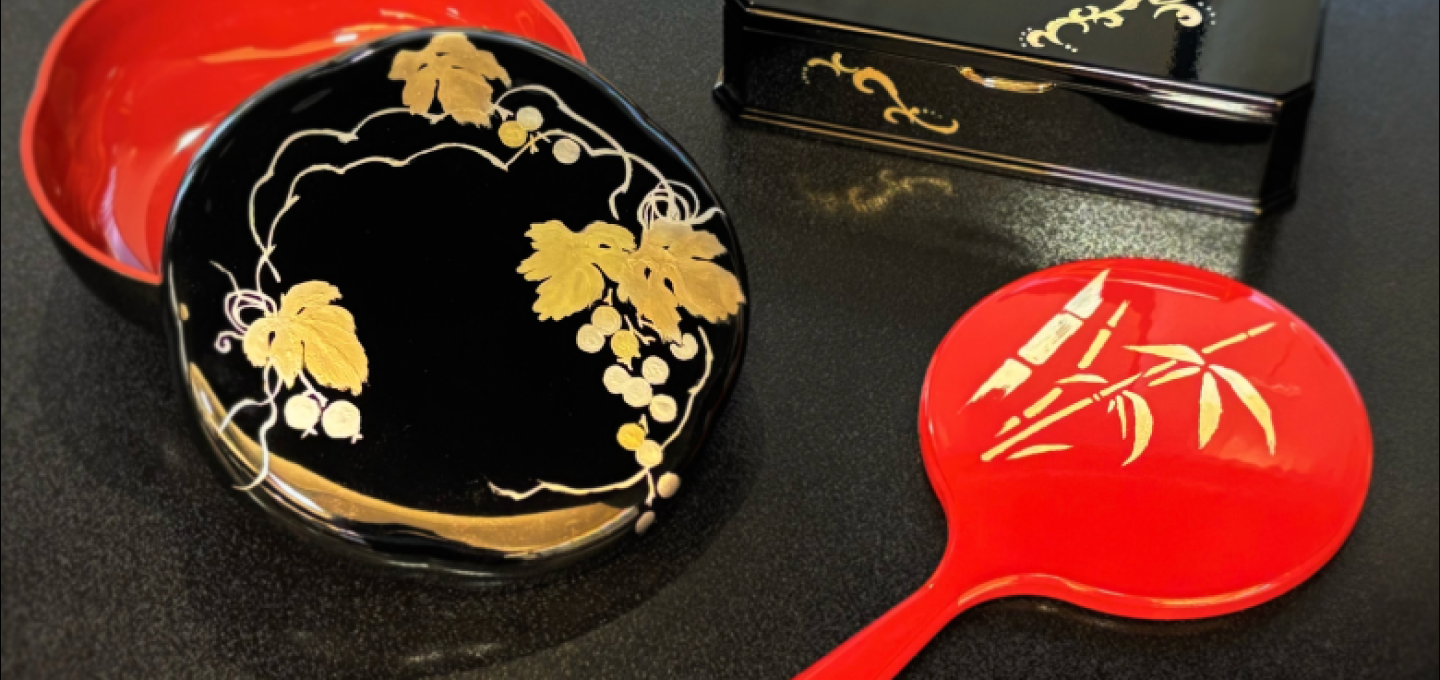
Special Experience
Tokyo
Maki-e Decoration Experience with Modern Techniques at a Longstanding Lacquerware Specialty Shop in Nihonbashi, Tokyo
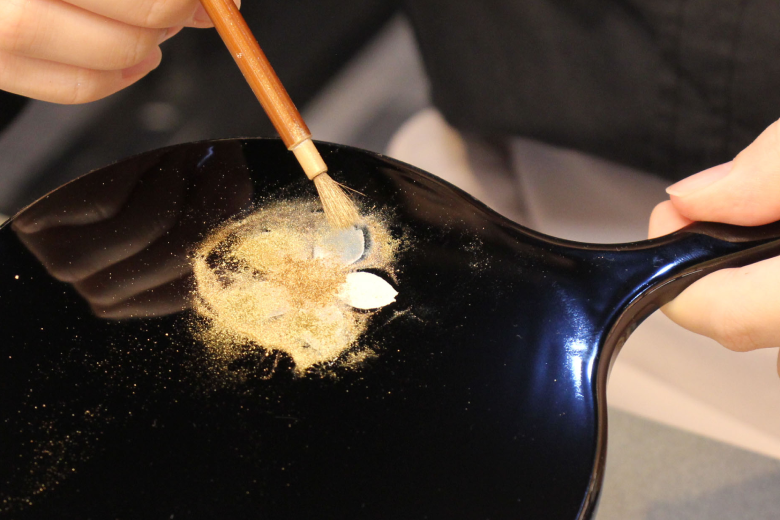
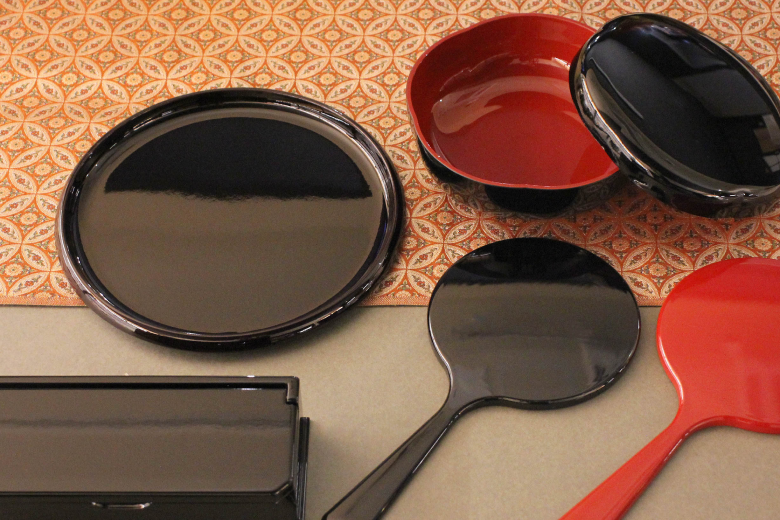
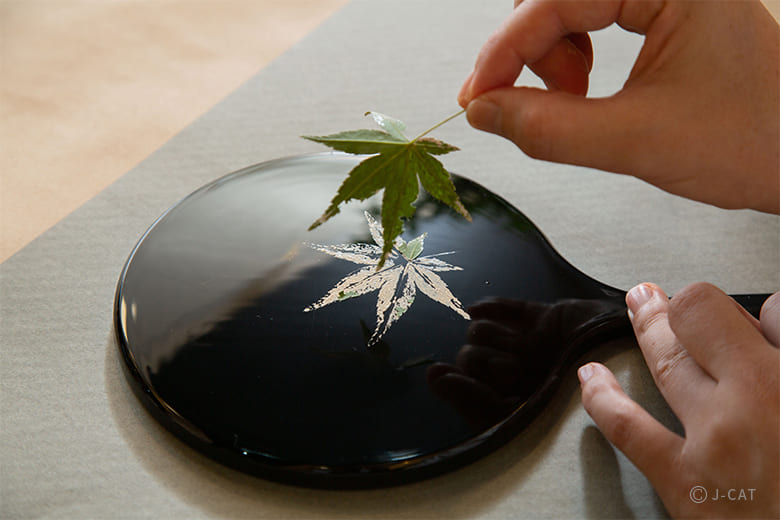
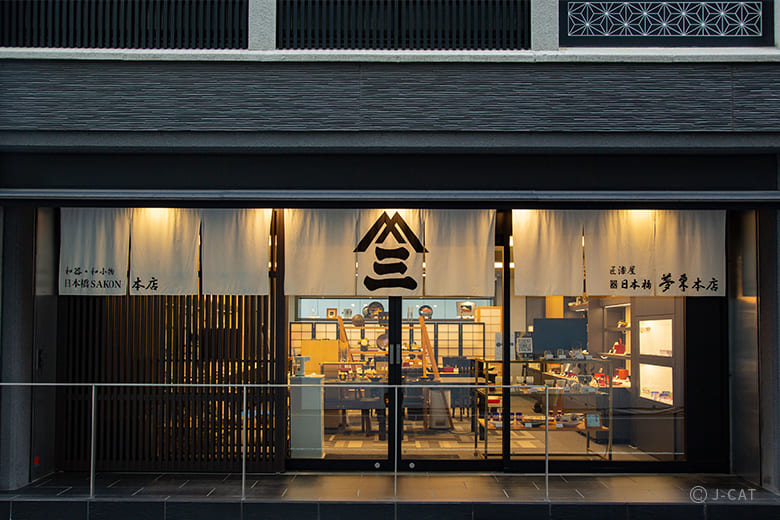
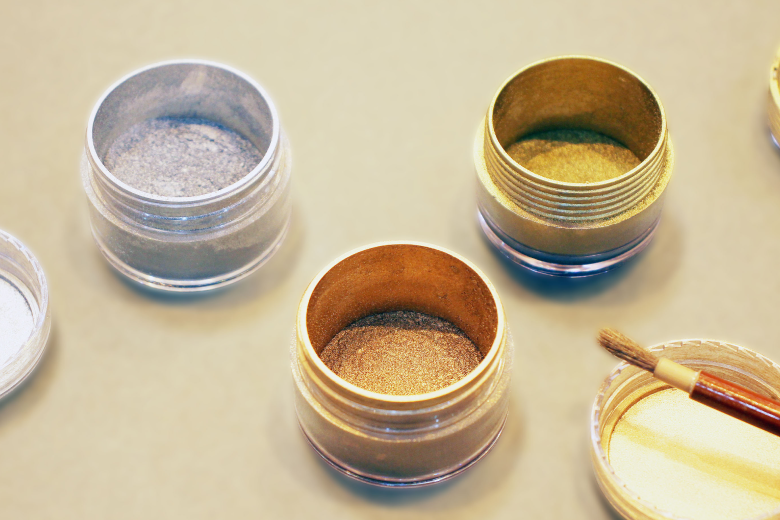
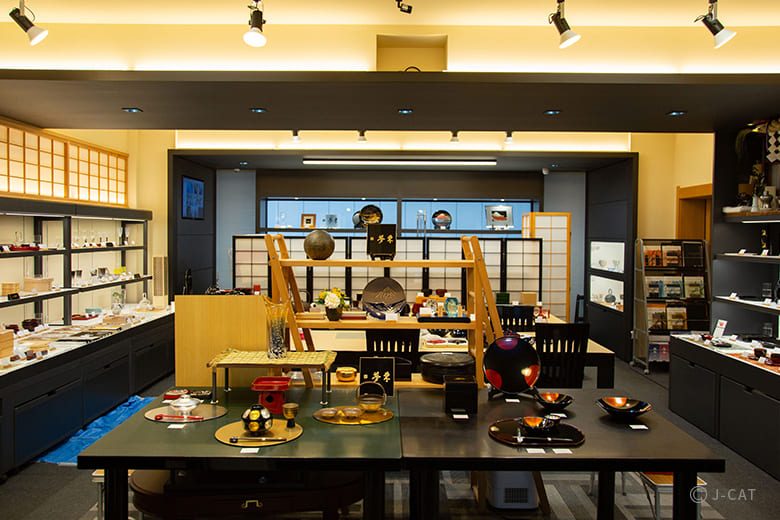
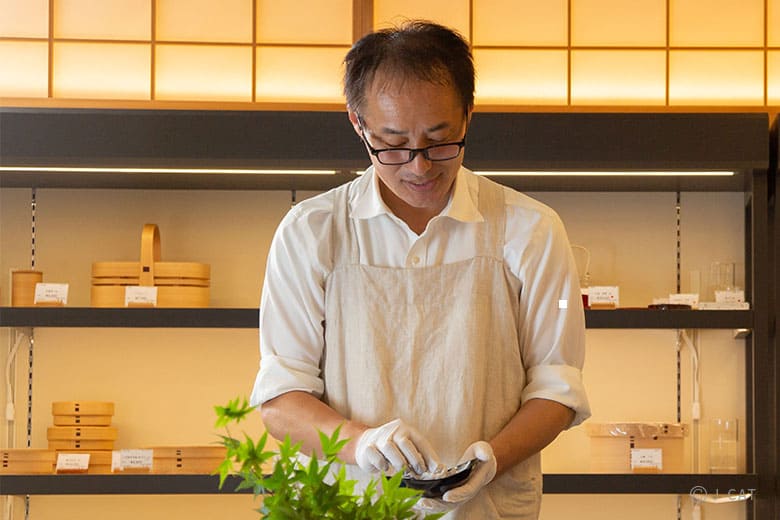
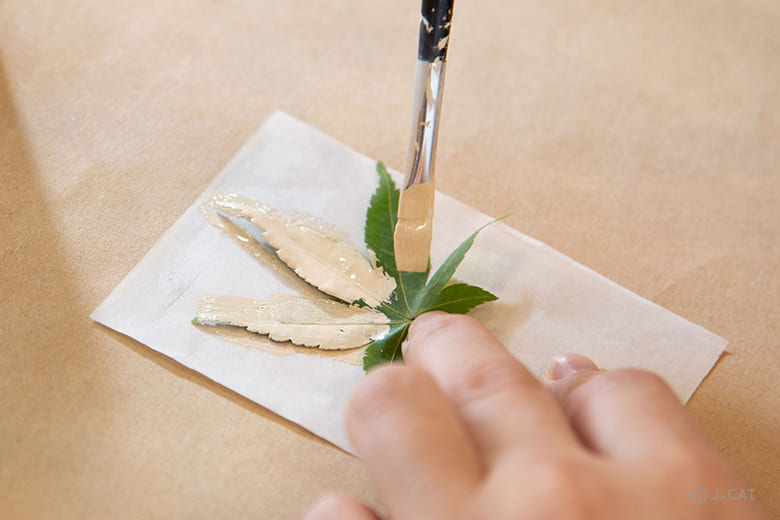
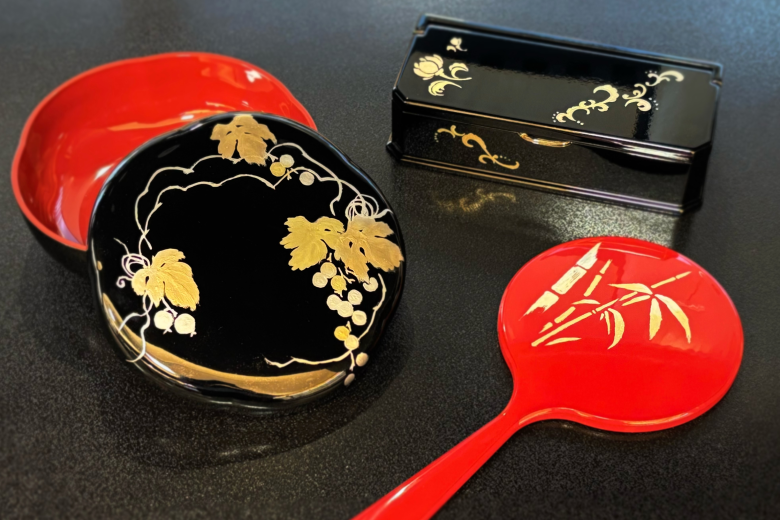
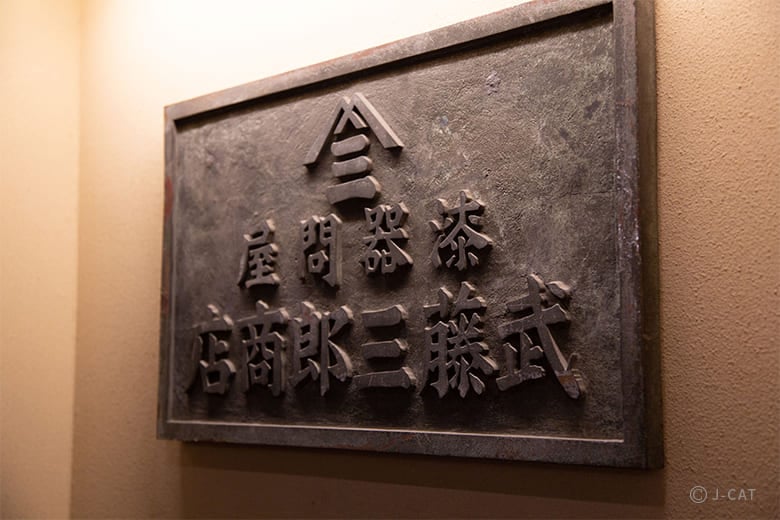










Overview
Learn the art of maki-e lacquerware adornment at the main store location of century-old lacquerware specialty shop Utsuwa Nihonbashi Mutoh. Maki-e is a traditional Japanese craft in which designs and patterns are drawn on the surface of finished lacquerware pieces with a fresh topcoat of lacquer as an adhesive base, then dusted with metallic powders such as silver or gold. Because wet lacquer is a skin irritant that takes practice to handle, guests will use the non-toxic alternative of cashew paint to draw their patterns as a base for the colored maki-e powder. Get hands-on with one of Japan’s iconic traditional crafts and create your own unique piece of art.
Key Features
・Immerse yourself in the charm of beautiful traditional crafts at a lacquerware specialty shop with over a century in the business
・Choose your piece to decorate from professionally hand-lacquered confectionery bowls, handheld mirrors, round trays, or rectangular boxes
・Create a unique personalized item using refined maki-e powder
*Guests interested in trying kintsugi dish repair and enhancement might be interested in this related plan:
Repair a Traditional Ceramic with Modern Kintsugi Techniques in Nihonbashi, Tokyo
Tokyo
90mins
from ¥32,000 /person
1 - 6 participants
Available in English
Cancel free up to 2 days prior
Details
Handle Genuine Japanese Lacquerware and Soak up the Aesthetics of Traditional Crafts
Tokyo’s Nihonbashi district has been an epicenter for aesthetic trends since the Edo Period (1603-1868). Its streets are still lined with a variety of longstanding fixtures of consumer taste, from small boutiques to larger department stores that grew out of historical roots as kimono shops. Here, as you step through the entryway curtain, a variety of works emanating warmth and fine craftsmanship greet you at Utsuwa Nihonbashi Mutoh’s main store, founded as lacquerware and glassware wholesaler.

The showroom, brimming with masterful craft works
The Nihonbashi main store location holds regular workshops to broaden awareness of and appreciation for the joy of traditional crafts, such as this Wabunka exclusive plan in which guests can practice maki-e for themselves, handling authentic lacquerware to appreciate the craftsmanship of its lustrous and silky surface, and adorning it with colorful designs of their own making.
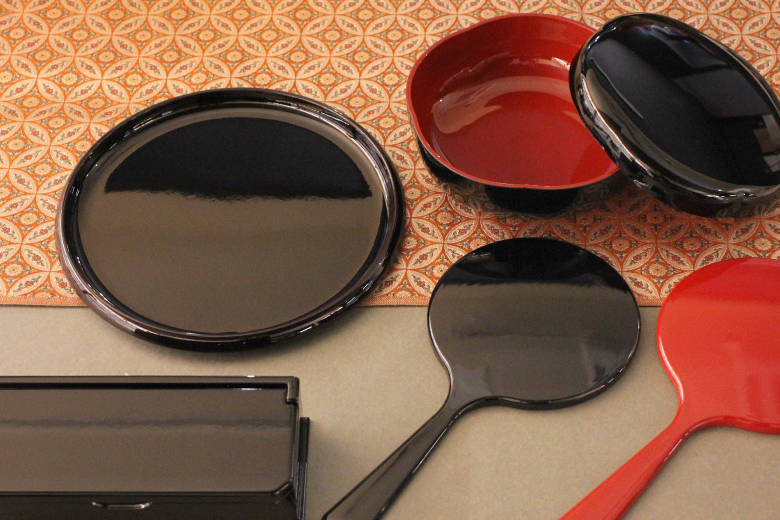
Lacquerware choices include confectionery bowls, handheld mirrors, round trays, and rectangular boxes
Beginning with an Introduction to Hira Maki-e Technique
Hira maki-e is the principal form of maki-e, in which a design is drawn with lacquer as an adhesive base and then pigment powders including metallics such as silver and gold are dusted on for color and depth (the word “maki-e” literally means “sprinkled picture”). Lacquer can be difficult to handle for beginners, due to its tendency to cause irritation when coming into contact with exposed skin. That’s why this experience uses cashew paint instead, which beginners can handle without fear of ending up with a rash.

Learn each step of the process in fascinating detail
Your instructor will start by talking you through the process so that you can approach it with a confident understanding of every step from start to finish. Enjoy watching an expert’s brush up close with explanations about the ideal angle and stroke techniques to use.
A Custom Item with your Own Original Design
After sufficient preparation with explanations and demonstrations, it’s time to put your newfound knowledge into practice. Choose your piece from confectionery bowls, handheld mirrors, round trays, and rectangular boxes. Then envision the design you want to apply. You can lay out your arrangement with a combination of traditional design stencil masking stickers and real maple leaves. The masking stickers are stuck on like normal stencils, with cashew paint brushed on through their cutouts. Maple leaves, on the other hand, are coated directly with the cashew paint and used to stamp their shape onto the lacquerware.

Apply an even coat of cashew paint with finessed strokes, taking care to avoid excess force
Crucial to the technique is a thin and even application of cashew paint. Stick the maple leaf to the surface of your piece, then cover it with thin paper and use your fingertips to press outward from the center with radial strokes in order to help the paint transfer over. Curved surfaces can make this a tricky process, but there is no need to worry: toothpicks, wooden skewers, and cotton swabs can all be used to correct shapes or wipe away mistakes while wet.

In three minutes, the image is transferred. Use caution when peeling the leaf away
Dust Your Design with Maki-e Powder to Create Your Final Vision
When your design is applied, sprinkle on a coat of maki-e powder. Three metallic shades of gold and silver are available for use in either simple single-color designs or combinations of two- or three-color gradients.
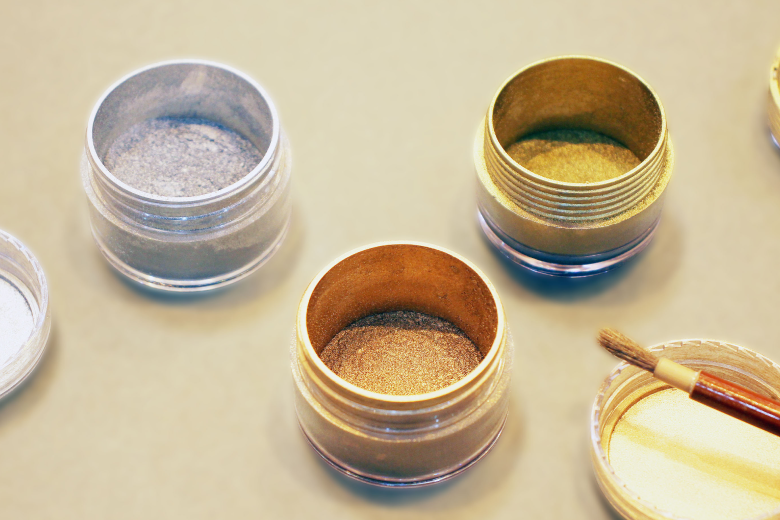
Add a touch of elegance with gold and silver maki-e powders
When using multiple colors, it’s never bad to have a little overlap at the borders between them. Bolder colors mean subtler details and richer undertones. When wiping away powder with a tissue, move gently and take care not to distort the silhouette. Use a similar technique to create your ideal gradient, placing the main color nearest you and brushing it slowly away from you with the tissue.
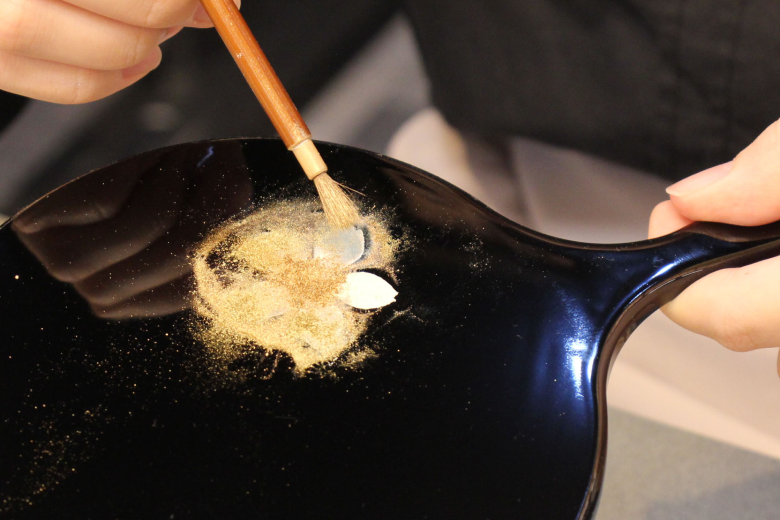
Even with the same pigments, no two pieces end up exactly alike
Works of Art that Grow in Uniqueness and Character with the Passage of Time
Take your piece home with you on the day of the experience and let it rest indoors in its box with the lid removed for 3-4 days, keeping it away from direct sunlight or other ultraviolet exposure. When this process is complete, the paint will be dry and the powder fully adhered. Simply wash away the excess with cold water, and your piece is complete.
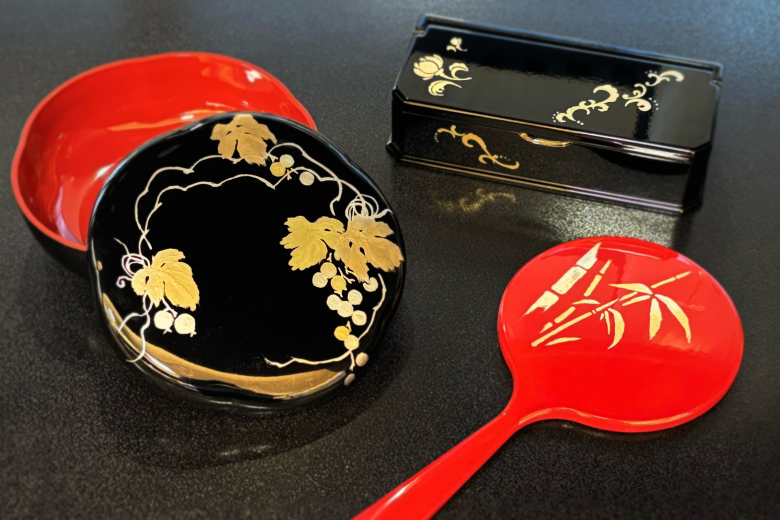
The art of maki-e is held to have begun in Japan’s Nara period (710-794)
Lacquerware ages best when kept out of ultraviolet light and excessively dry environments. After washing, it should be simply wiped dry (not polished) to maximize its luster – which grows over time if properly cared for. We hope you will delight in your unique personalized piece of traditional Japanese maki-e lacquerware and its handsome aging properties for a long time to come.
Utsuwa Nihonbashi Mutoh Main Store

Utsuwa Nihonbashi Mutoh Main Store
Founded 1923 in Tokyo’s Nihonbashi as a wholesaler specializing in lacquerware, Utsuwa Mutoh Nihonbashi has been in the business of fine lacquerware and glassware for over a century. While its main clients are department stores, it also holds a variety of workshop events to spread awareness of and appreciation for such traditional Japanese crafts as maki-e and kintsugi – both to broaden their appeal and safeguard their place as the cultural heritage of future generations.
Customer's Voice
It was AMAZINGGGGGGGGGGGGG <3 High quality traditional Japanese experience with industry masters.
J.K. Taiwan
This experience reinforced our love of Japanese art and appreciation for cultural heritage that Japan continues to preserve.
R.P. Ireland
Excellent experience, highly recommended for anyone visiting Tokyo. Although this experience might seem "high priced" when you consider the quality of the items that you work on and take home, it is actually quite well-priced. I think just being able to see our kids working so hard on their lacquerware, and having the full support of the staff to help them out (and being able to communicate easily). We definitely gained some respect for the creation of lacquerware, and the hard work that goes into creating timeless pieces.
R.L. Canada
Location
Utsuwa Nihonbashi Mutoh Main Store
Chuo Ward, Tokyo
Request for booking
Select first preferred date (JST)
February 2026
Sun
Mon
Tue
Wed
Thu
Fri
Sat
Instant Booking
Request Booking

17
Full

17
Unavailable
- Instant Booking: Your reservation is confirmed immediately upon payment.
- Request Booking: You will receive confirmation after the host reviews your request.
Tokyo
90mins
from ¥32,000 /person
1 - 6 participants
Available in English
Cancel free up to 2 days prior
Things to know
Contact Us
If you have any questions, please contact us using the form below.
We also accept bookings from corporate clients and travel agencies.